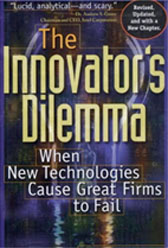You don’t have to be an entrepreneur to be an innovator. Becoming a startup CEO may not be your thing, but changing the world is always within your reach.
There is a frenzy of late among those longing to lead business startups, and that is exciting. Entrepreneurs are a special breed, and while the successful ones are rare, no one really knows who is going to be successful in advance. Naysayers will tell you what you can’t do, and only you can prove them wrong.
When we talk about innovation, that undoubtedly points to entrepreneurs, but I’d like to think it not exclusive to them. Innovation is a process where creativity is harnessed, often galvanized through the building of momentum and the sharing of a vision. Often a new project or the reinvention of a product type begins with very few people involved, perhaps only one. The idea is refined and vetted, resources are added, more people get onboard, a consensus around a feature set emerges, and eventually it comes to be owned by a team. If you’ve ever been a part of this kind of team, you know how invigorating the process can be.
A subset of this process is the highly competitive world of funded startup companies, and that is a different beast entirely. In a quite insightful op-ed in the Wall Street Journal about the trials and tribulations of Uber, Andy Kessler recently noted the sometimes seething nature of a startup CEO who makes it through the hurdle of significant investment in their ambitions to excavate a gold mine:
Hubris becomes an asset. Startup CEOs are always saying the goal is to “suck the oxygen out of the room” of their competitors. Success requires a certain bravado. That should be encouraged, but most entrepreneurs have no idea when to turn it off.
There’s nothing wrong with being competitive, embracing ambition, and wanting to do the impossible. Does the goal of that have to be the annihilation of those who currently populate a market segment? Maybe because it’s the holidays, I wonder how that thinking aligns with Give Peace a Chance, but I think you can change the world without an ethos of leveling good chunks of it.
It is important to our economy and financial well-being that new companies are constantly born, that creative destruction replaces old opportunities with new ones. It is also limiting to evaluate innovation on this metric alone. If the only creativity that receives our highest praise is the moonshot IPO or breathtaking acquisition multiple, perhaps we send a difficult message to our colleagues and children that commercial success is the most important success. Do we really believe that it is somehow less noble to be part of reinvention that is not about clubbing a competitor over the head and walking away with his or her bounty?
 Much has been written around the concept of disruption, where traditional ways of doing things are derailed in almost unbelievably short periods of time. We saw it happen with music and video, where digital media disrupted the business model of selling and renting physical media. We’re seeing it happen with the news business, most recently evidenced at The New Republic, where the economics of professional journalism are colliding with the realities of recovering its cost. Disruptors are a very real force as author Clayton Christensen so clearly taught us in his landmark book The Innovator’s Dilemma, but is it an end unto itself? What if someone doesn’t want to be a war-declaring disruptor?
Much has been written around the concept of disruption, where traditional ways of doing things are derailed in almost unbelievably short periods of time. We saw it happen with music and video, where digital media disrupted the business model of selling and renting physical media. We’re seeing it happen with the news business, most recently evidenced at The New Republic, where the economics of professional journalism are colliding with the realities of recovering its cost. Disruptors are a very real force as author Clayton Christensen so clearly taught us in his landmark book The Innovator’s Dilemma, but is it an end unto itself? What if someone doesn’t want to be a war-declaring disruptor?
There are all kinds of ways to define admirable innovation. Truth be told, very few of us are going to draft a business plan and schlep from angel to venture to institutional investors with an all-or-nothing mentality. If that’s not you but you still feel a hunger to join the reinvention movement, here are seven concrete ways you can embrace innovation right now:
- Give Yourself a Stealth Performance Review: Secretly write down exactly how you think you are doing at work. Be as candid as possible. Conclude with a set of recommendations for improvement. Pick one. Do it.
- Ask Your Boss for a Problem: Walk in and say, “How can I take a burden off your back? Give me something on your to-do list that is important but you don’t have time to do. Let’s brainstorm it together.” Always remember that every problem is an opportunity.
- Clarify Your Brand Promise: If you don’t know what your company stands for, ask someone in senior management for some evangelism around your company’s brand. Then look at the work you are doing every day. Does it align with the brand promise? If not, what tweaks can you make to your daily tasks to bring you personally more in line with your company’s expressed mission?
- Help a Non-Profit: Find an organization near you whose values and mission you embrace. Contact someone there in a leadership capacity. Tell them you want to help and what skills you have to offer. Ask them what is on their plate that isn’t being addressed. Address it.
- Fix Your Personal Budget: Develop a formal income statement for yourself or your family. Write down all sources of revenue and expenses. Look for areas where money is leaking out that needn’t be. Plug the holes. Get your credit under control. If you have longer-term needs, create a formal plan for getting there.
- Get a Hobby: Right, you don’t have the time. Yet a hobby allows you to abstract so many of your daily thoughts and tie back that problem solving to your everyday responsibilities. Plant a garden, bake, follow a sports team, adopt a pet. Don’t think of it as a diversion, think of it as a commitment to lifelong learning and self-improvement. Push yourself to approach it slightly differently from those already doing it.
- Coach a Friend: Look around your circle of acquaintances for someone who might be struggling a little. Offer to be a coach or mentor for the next six to twelve months. Ask nothing in return. I promise you the ideas that will emerge from your discussions will be as valuable to your personal growth as they are to the friend. Ideas and energy compound when shared. You may forget who is coaching whom.
Startups can be cool, but all innovation does not require a startup environment. Creativity is a process that leads to all kinds of new stuff, and it also exhausts dead ends around stuff not worth doing or not ready to be done. Instead of making a hollow new year’s resolution, pick a path to one of the above suggestions or come up with your own idea for reinventing the world around you. Everyday Innovation is there for the taking. Go make change happen, and I’ll see you at the starting gate!

